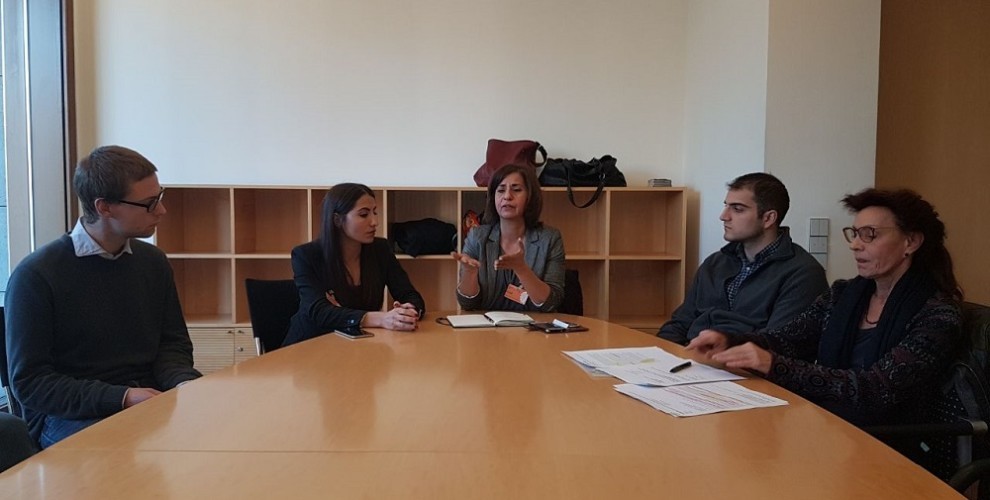Kurdish and German politicians: Ban on Kurdish symbols unlawful
German and Kurdish politicians condemned the recent attacks against Kurdish protestors by German police and said that Germany’s ban on Kurdish symbols is unlawful.
German and Kurdish politicians condemned the recent attacks against Kurdish protestors by German police and said that Germany’s ban on Kurdish symbols is unlawful.

A press conference was held in German parliament on Friday with the participation of Left Party (Die Linke) MP Ulla Jelpke, Peoples’ Democratic Party (HDP) MP Tugba Hezer, Co-chair of Democratic Kurdish Society Center in Germany (NAV-DEM) Ayten Kaplan and lawyer Lukas Theune.
The press statement focused on the German state’s ban on Kurdish symbols, focusing on the German police’s attacks against peaceful demonstrations who protested Germany’s ban on Kurdish symbols in Düsseldorf on November 5.
Die Linke’s Ulla Jelpke pointed out German Interior Ministry’s efforts to expand the PKK ban and said that there are differences about federal states’ approach to the ban. Jelpke recalled the recent police attacks against the Öcalan Library Bus, which was on tour to publicise Kurdish leader Abdullah Öcalan’s books and ideas.
Recalling a Belgian court’s ruling that “PKK is not a terrorist organisation but a party in a non-international armed conflict”, Jelpke told the reporters that Die Linke will stand behind their appeal against the PKK ban to the German parliament.
Jelpke also criticized Germany for arbitrary implementation of the PKK ban and said: “For example the Öcalan Library Bus didn’t face an obstacle in Hamburg, but it was stopped in Hannover because of Öcalan’s posters. This alone tells us how unlawfully the German police are acting. Similarly, if a Kurd carries flags of YPG and YPJ this is viewed as propaganda for the PKK and it is banned. It is also prohibited for a German citizen to carry a YPG flag to show solidarity with YPG. The Interior Ministry openly declared these to us.
However, the Ministry also told us that YPG and PYD are not banned. But their flags are banned for Kurds. There is a such an arbitrary approach. We must stand against this. We must struggle against this unlawfulness. We need to appeal to European Court of Human Rights in the event of an exhaustion of domestic remedies on this issue. Because the criminalization, oppression or arrest of Kurdish people for very simple reasons doesn’t go along with a state of law.”
Speaking after, Democratic Kurdish Society Center in Germany Co-chair Ayten Kaplan said that they see an analogy between Turkey and Germany’s policy against the Kurds.
“In Turkey there is an anti-democratic situation in which human rights are laid aside, opposition members are detained every day and journalists are oppressed. And unfortunately the same situation is experienced by Kurds in Germany. Recently various symbols have been banned with a notice by German Interior Minister De Manzier.
Some federal states don’t want Öcalan’s name in open meetings. Some ban posters and some ban posters with a specific colour. For example they prohibit people to hold Öcalan’s posters in a demonstration set to demand freedom for Öcalan. We see an analogy between Turkey and Germany in their political approach against Kurds. In Germany the right of assembly is denied to the Kurds. The flags of those who are fighting for us are banned” Kaplan said.
Kaplan accused Germany of criminalizing Kurds with bans and said “We are the second largest organisation in Germany and we have thousands of members. We will never accept the criminalization policy against us.”
HDP MP Tugba Hezer spoke about Turkey’s isolation on Kurdish leader Abdullah Öcalan and said “Erdogan, who impose a war and political deadlock, is subjecting Kurdish leader Abdullah Öcalan to isolation, which targets both the Middle East and the solution process in Turkey.”
Hezer recalled that Öcalan is denied all his and added: “Neither his family and lawyers nor any other delegation is allowed to get information about his health. This is an isolation and is a crime against humanity. The European public opinion should react against such an open unlawfulness by Turkey which is holding full membership negotiations with EU and which is a member of ECHR.”
“Ending the isolation on Öcalan is important for peace in Turkey, Kurdistan and the Middle East. The German state should not treat the Kurdish question like Turkish state. The Turkish approach is based on a denial of Kurds and it pursues a parallel criminalization process. We all paid a price because they handle the Kurdish question as a security problem. This is why thousands of Kurds had to seek refuge in Germany and Europe.”
Lukas Theune, a lawyer of Kurdish politicians and activists, said that the lawsuits against Kurds in Germany are political.
“The Ministry of Justice demands that the PKK and Kurds be put under surveillance, but it does not specify the reason behind it. The ministry doesn’t put forward any justification despite our questions. The same situation is valid for the ban on the flags. In the related notice of ban, it is not exactly clear it is about. The decision to ban PYD, YPG and YPJ flags is definitely political. There is nothing like his in the law.”
Lawyer Theune underlined that: “In my opinion Germany pursues oppression policy against the Kurds because of the deals with Turkey. Schröder met with Erdoğan and gave some promises to Turkey to secure the release of German human rights defender Peter Steudtner. After this meeting German police attacked Kurdish demonstrators in Dusseldorf. Öcalan can’t be banned because he is not an association.”